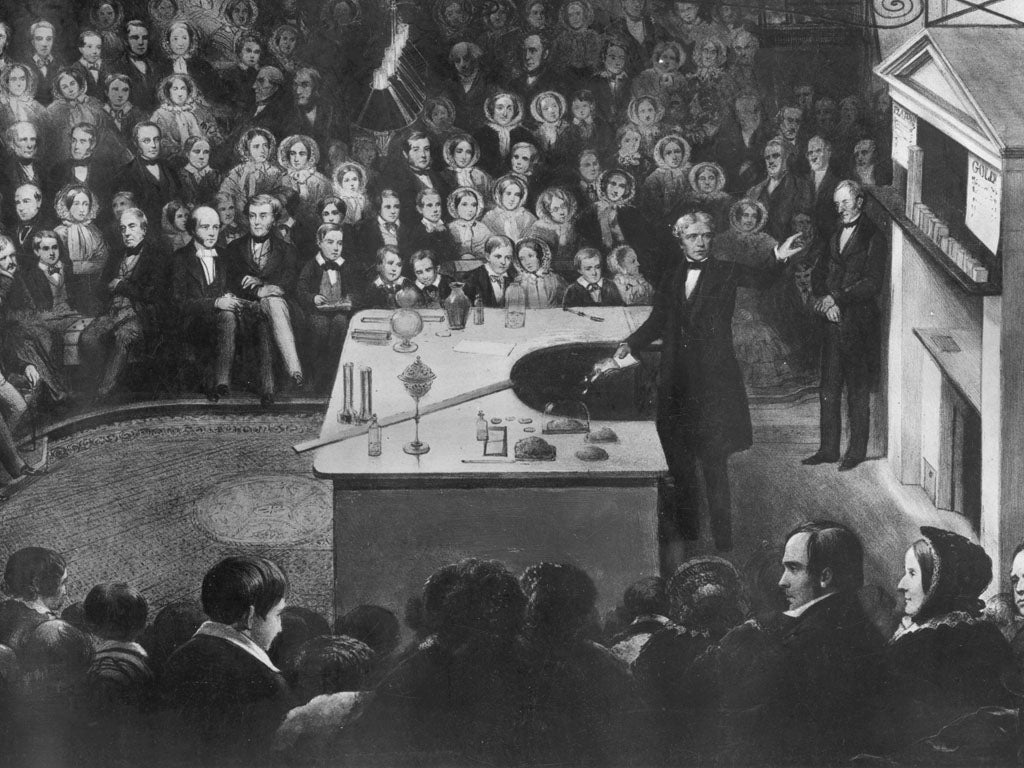Save the Royal Institution! Why selling this historic Mayfair building would be a betrayal of our heritage
This neoclassical temple on Albermarle Street hosted Michael Faraday - as the picture below testifies. Will we really let it be converted into a vile jewellers or luxury flats?

Your support helps us to tell the story
From reproductive rights to climate change to Big Tech, The Independent is on the ground when the story is developing. Whether it's investigating the financials of Elon Musk's pro-Trump PAC or producing our latest documentary, 'The A Word', which shines a light on the American women fighting for reproductive rights, we know how important it is to parse out the facts from the messaging.
At such a critical moment in US history, we need reporters on the ground. Your donation allows us to keep sending journalists to speak to both sides of the story.
The Independent is trusted by Americans across the entire political spectrum. And unlike many other quality news outlets, we choose not to lock Americans out of our reporting and analysis with paywalls. We believe quality journalism should be available to everyone, paid for by those who can afford it.
Your support makes all the difference.Here are three stories which you may have missed today that, in very different ways, offer hope of a better world.
Our peerless Science Editor, Steve Connor, reported the discovery that “human DNA can naturally wrap itself into a different shape – a quadruple helix – in a breakthrough that could point the way to new cancer treatments”. Apparently the quadruple DNA helix is “more common in cells that are rapidly dividing, indicating that it could be important in determining whether or not a cell becomes cancerous” – a subject close to my heart at the moment.
Thrilling
Next, a paper in the journal Nature Geoscience described how Professor John Parnell and Dr Joseph Michalski assessed the huge McLaughlin Crater on the surface of Mars. Their discovery was thrilling: rocks flung up by a meteorite show evidence of minerals that appear to have been altered by water. This could be the best evidence yet of life on the red planet.
Finally, I saw this headline on newscientist.com: “Low power laser may keep blindness at bay”.
Could anyone but a misanthrope read these stories – all of them the result of years of effort by scientists in Britain – and not feel a sense of exhilaration? The vast majority of us lead lives both totally devoid of science (we think about dinner, not DNA, while waiting for the bus) and totally full of science, in that all our material comforts are the product of pioneering work by the men in white coats. And it’s in the context of this second point that we should greet the appalling news that the Royal Institution (RI) is for sale.
Or at least, its building is. If you haven’t been to this stunning monument to Victorian ambition, you really must. It’s the neoclassical temple on Mayfair’s Albermarle Street in which Michael Faraday – you know, the dude who discovered electromagnetic induction, invented the electric motor, founded nanotechnology – did his work, as did countless other great Britons (John Tyndall, James Dewar, George Porter, etc).
Abandoned
But because of a £22m refurbishment in 2008, and a subsequent recession, the RI is £7m in debt. The trustees are considering selling the building.
Short of famine, genocide and horse meat burgers, I honestly can think of few things more antithetical to our common humanity than the idea that this noble building will be sold off and replaced by some vile jeweller or Sicilian restaurant, or converted into luxury apartments.
If you bother to read the international pages of this or any other half decent newspaper, you’ll see that the countries that are surging toward global dominance are investing very heavily in science, research, and technology. In the meantime, we’re thinking about abandoning the embodiment our scientific heritage in honour of the latest Mayfair monstrosity.
Have we gone mad?
Join our commenting forum
Join thought-provoking conversations, follow other Independent readers and see their replies
Comments